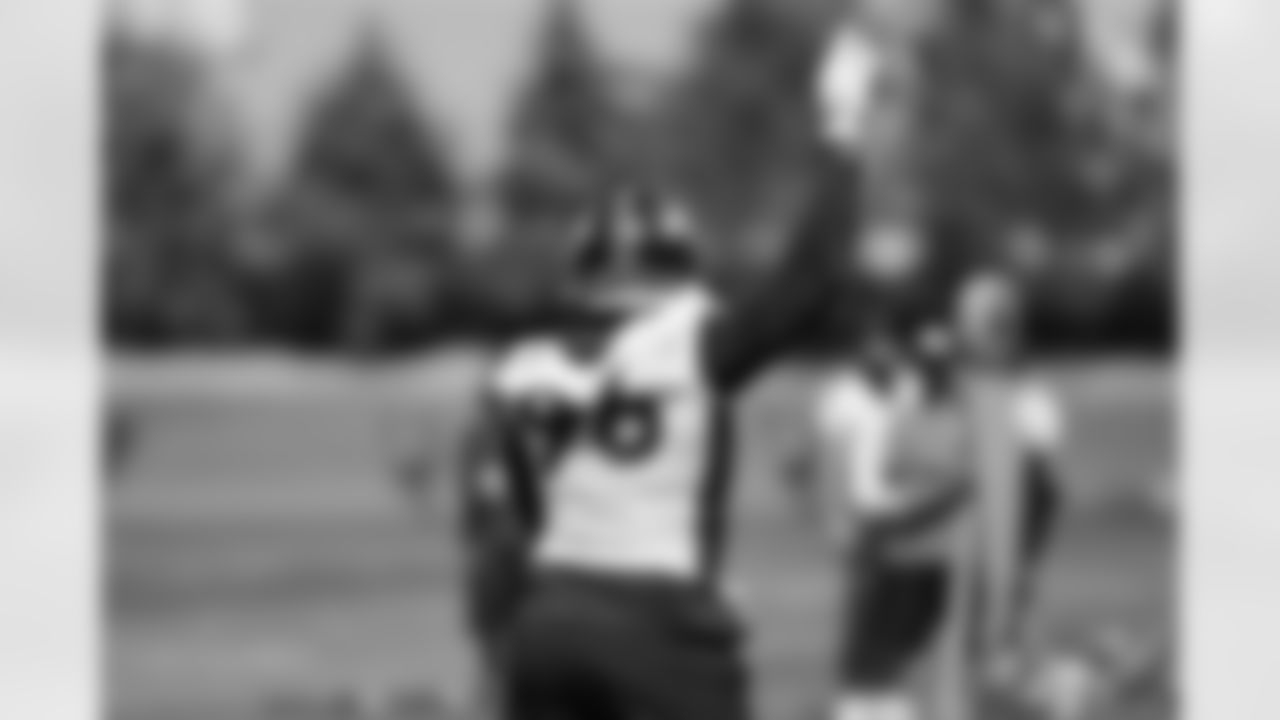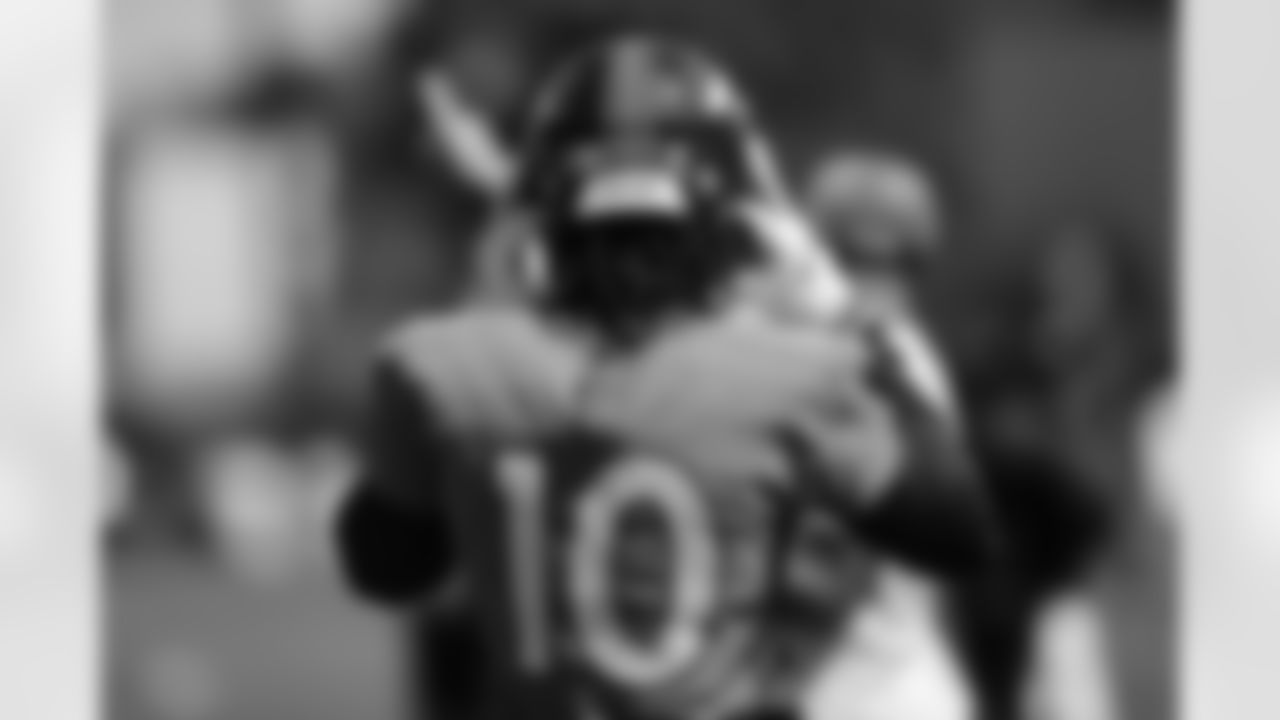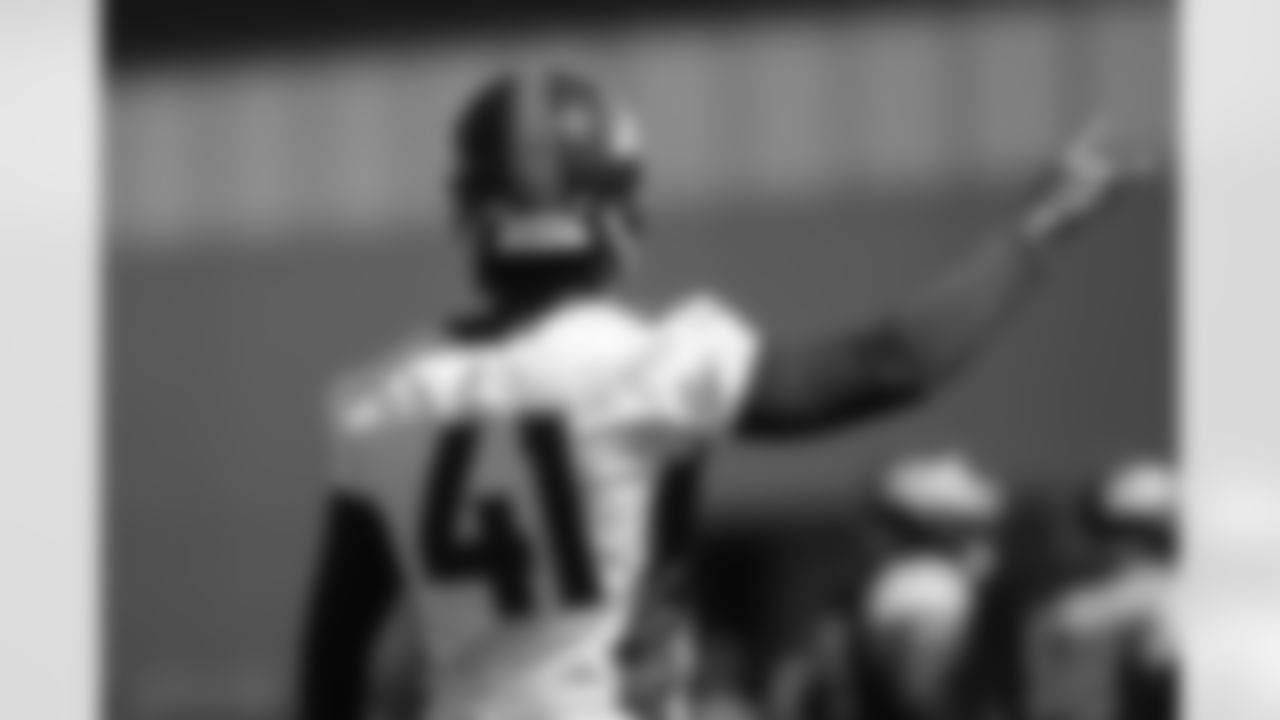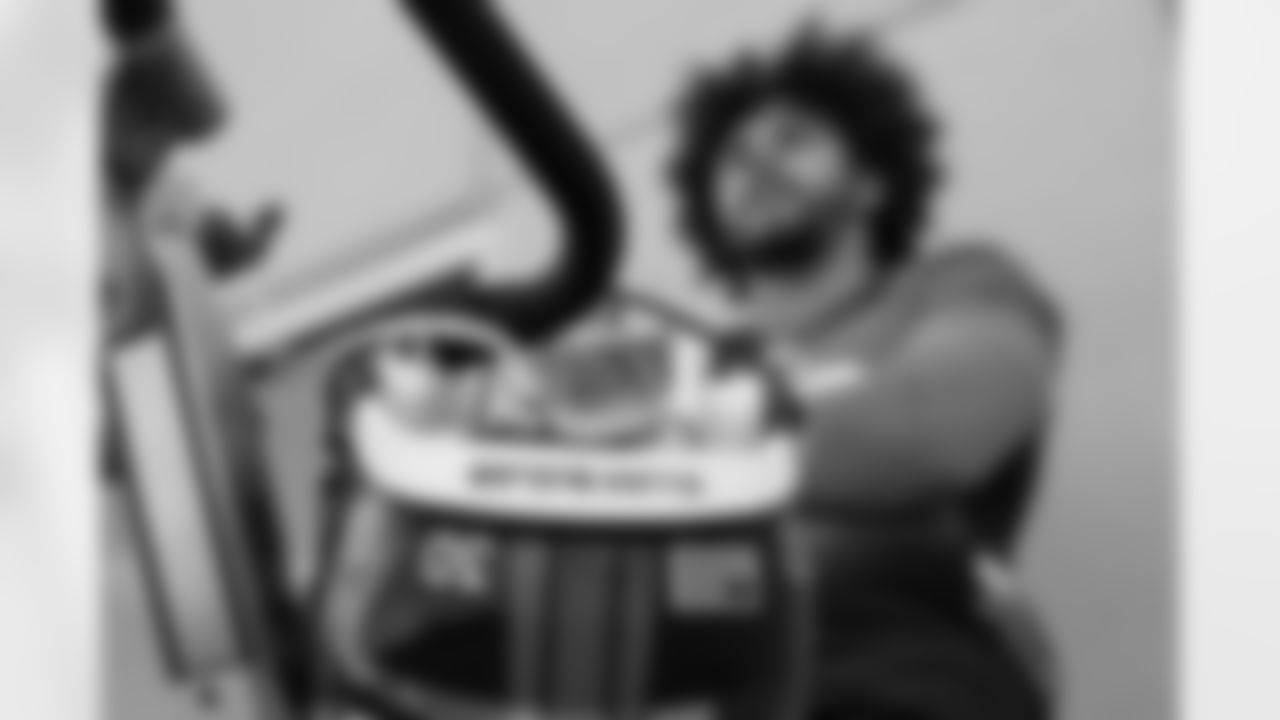ENGLEWOOD, Colo. — Like dozens of players and coaches on Monday night, Assistant Strength and Conditioning Coach Anthony Lomando will be representing more than just the Denver Broncos.
Some have chosen to spotlight certain messages, like "It Takes All of Us" or "End Racism." Several players selected to honor victims of police brutality or acts of racism, like George Floyd or Breonna Taylor, whose deaths at the hands of police sparked a wave of protest and unrest that spread throughout the country and around the world over the past four months.
For players, decals bearing the names or messages are placed on the bottom of their helmets, just over the name plates on their jerseys. For coaches, patches are sewn into their hats.
Lomando had someone in mind for this honor, but it didn't quite fit the assumed parameters.
The name he wanted on his cap belongs to a close friend who overcame acts of racism to become an assistant United States attorney.
That would be Jason St. Julien.

Perhaps the most memorable act of racism that St. Julien experienced was when he was about 16 years old.
One day before school, as he walked to his car outside his home, he was surprised to see several law enforcement officers speaking with his father. Trying to distract St. Julien and to send him on his way, his father urged him to leave immediately.
But before he did, St. Julien got a peek at what had caused this mysterious group to gather in front of their house: two black cats had been killed and disemboweled on their front yard.
It was impossible not to get the message; they were the only black family on the block.
"Whoever killed those black cats and put them in our yard, their purpose was to make us afraid, to send a message, to make us fear for our safety and possibly to say, 'Hey, get out of the neighborhood,'" St. Julien says. "Possibly. At the very least, to strike fear in us and make us question our very own safety."
Reacting to that terrible episode, St. Julien struggled. He couldn't help but wonder if he knew who did it. He didn't know if he was the target — it could have been directed at his brother or his father, who had received racist hate mail at one point — but how could he not imagine that possibility?
"The precarious situation that black and brown people are in is OK, like look, what am I going to do? Beat him up at school? Because if I do, I'm going to get expelled and I'll probably get arrested. So where is that going to take my future?" St. Julien says. "And so it's this balancing act, this tightrope walk of what can I do to defend my dignity while at the same time not getting arrested."
Thinking of it now, St. Julien describes the internal back-and-forth that is so common for people like him. It doesn't matter if it's as blatantly horrific as killing cats or perhaps more systematic and covert like redlining or prejudicial lending practices; the individual reactions follow a familiar pattern.
"The best way I can explain it is it's like a rubber band. It's expanding and contracting, expanding and contracting, expanding and contracting," St. Julien says. "Like, Wait, that really happened this morning. Wait, wait, wait. But who would do that? No, no, Jason, that really happened.
"It's this expanding, contracting, expanding, contracting hundreds of times a day. Especially as a 16-year-old. And I'm wondering — I see people smiling and laughing and joking with me, and I'm like, Is it them? Or do they know who did this? And if they did, would they have the audacity to smile in my face and still joke with me?"
As St. Julien grew up, eventually becoming a lawyer and moving to Denver, he internalized the only lessons that could possibly be learned from incidents like these, however self-destructive.
"I lived my life for 33 years with this story that I'm not good enough and that I'm not good enough because I'm black, that I'm a forever second-class citizen — no good will ever come from me, I'm not good enough for this job, I'm not good enough for this salary — it's just I'm not worthy," St. Julien says. "And that's how I lived my life. To me, that was reality, that was the truth, because everything I had ever experienced just confirmed that. From all the experiences in elementary school, middle school, high school, law school — that was life."
That way of life, ruled by a falsehood that could no longer hold any power over him, would be broken, though.
The Broncos added decals to their helmets ahead of the start of the regular season to honor victims of racism and police brutality and support social justice initiatives.

Phillip Lindsay holds his helmet bearing a decal for Elijah McClain during practice on September 12, 2020. (Photo by Ben Swanson)

Courtland Sutton's helmet bearing a decal that has Elijah McClain name during the application of decals supporting social justice initiatives and honoring victims of police brutality and racism on September 11, 2020. (Photo by Ben Swanson)

Melvin Gordon III's helmet bears a Black Lives Matter decal during practice on September 12, 2020. (Photo by Ben Swanson)

Nick Vannett's helmet bearing a decal that has George Floyd's name during the application of decals supporting social justice initiatives and honoring victims of police brutality and racism on September 11, 2020. (Photo by Ben Swanson)

A sheet of "It Takes All of Us" decals during the application of decals supporting social justice initiatives and honoring victims of police brutality and racism on September 11, 2020. (Photo by Ben Swanson)

Drew Lock's helmet bearing a decal that reads "Stop Hate" during the application of decals supporting social justice initiatives and honoring victims of police brutality and racism on September 11, 2020. (Photo by Ben Swanson)

Jurrell Casey holds up his helmet bearing a Black Lives Matter decal during practice on September 12, 2020. (Photo by Ben Swanson)

A.J. Bouye's helmet bearing a decal that reads "End Racism" during the application of decals supporting social justice initiatives and honoring victims of police brutality and racism on September 11, 2020. (Photo by Ben Swanson)

A sheet of decals with Elijah McClain's name during the application of decals supporting social justice initiatives and honoring victims of police brutality and racism on September 11, 2020. (Photo by Ben Swanson)

Royce Freeman's helmet bears a decal for Breonna Taylor during practice on September 12, 2020. (Photo by Ben Swanson)

Graham Glasgow's helmet with an "It Takes All of Us" decal during the application of decals supporting social justice initiatives and honoring victims of police brutality and racism on September 11, 2020. (Photo by Ben Swanson)

A helmet with an "It Takes All of Us" decal during the application of decals supporting social justice initiatives and honoring victims of police brutality and racism on September 11, 2020. (Photo by Ben Swanson)

Nick Vannett's helmet bearing a decal that has George Floyd's name during the application of decals supporting social justice initiatives and honoring victims of police brutality and racism on September 11, 2020. (Photo by Ben Swanson)

Shelby Harris holds up his hand during practice on September 12, 2020. (Photo by Ben Swanson)

A sheet of decals with Jacob Blake's name during the application of decals supporting social justice initiatives and honoring victims of police brutality and racism on September 11, 2020. (Photo by Ben Swanson)

Graham Glasgow's helmet bearing a decal that reads "It Takes All of Us" during the application of decals supporting social justice initiatives and honoring victims of police brutality and racism on September 11, 2020. (Photo by Ben Swanson)

Diontae Spencer's helmet bears a Black Lives Matter decal during practice on September 12, 2020. (Photo by Ben Swanson)

Nick Vannett's helmet bearing a decal that has Elijah McClain's name during the application of decals supporting social justice initiatives and honoring victims of police brutality and racism on September 11, 2020. (Photo by Ben Swanson)

Kevin Toliver II's helmet bears the name of Jordan Davis, a teenager from his hometown who was murdered in 2012, during practice on September 12, 2020. (Photo by Ben Swanson)

Drew Lock's helmet bearing a decal that reads "Stop Hate" during the application of decals supporting social justice initiatives and honoring victims of police brutality and racism on September 11, 2020. (Photo by Ben Swanson)

Jerry Jeudy pulls on his helmet, which has a Stop Hate decal, during practice on September 12, 2020. (Photo by Ben Swanson)

McTelvin Agim's helmet with a decal for Elijah McClain during the application of decals supporting social justice initiatives and honoring victims of police brutality and racism on September 11, 2020. (Photo by Ben Swanson)

Graham Glasgow's helmet bearing a decal that reads "It Takes All of Us" during the application of decals supporting social justice initiatives and honoring victims of police brutality and racism on September 11, 2020. (Photo by Ben Swanson)

Phillip Lindsay's helmet bears a decal for Elijah McClain during practice on September 12, 2020. (Photo by Ben Swanson)

The back of De'Vante Bausby's helmet bears a decal for Carmeron Lamb, a high school classmate killed by police in 2019, during practice on September 12, 2020. (Photo by Ben Swanson)

Jeff Driskel's helmet bearing a decal that reads "Stop Hate" during the application of decals supporting social justice initiatives and honoring victims of police brutality and racism on September 11, 2020. (Photo by Ben Swanson)

Phillip Lindsay's helmet bearing a decal with Elijah McClain's name during practice on September 12, 2020. (Photo by Ben Swanson)
What role can I play or do I want to play?
This is the question that St. Julien faced and still wrestles with. It's a question that countless people are facing and one that has no easy answers.
When George Floyd died after a Minneapolis police officer kneeled on his neck for almost nine minutes, St. Julien began to reckon with his own voice.
After being isolated during the initial months of the COVID-19 pandemic, he reached out to several friends to explain his feelings in detail, and he requested that they challenge instances of racism if they hear or see them.
Lomando, who met St. Julien about four years earlier at a personal growth and development program, was among those who received a message from St. Julien and responded enthusiastically.
As the response grew, St. Julien was encouraged to expand on his message to pitch an opinion article.
"Anthony was part of my team," St. Julien said. "We talked about the article. I showed him my draft and we talked about it. More important than his perspective on my draft before we sent it out was that he was totally in my corner. There was never a doubt of him not being in my corner, not supporting me. He continually kept saying, like, Man, this is big. You have no idea how your voice is going to make a difference in the world. People need to hear this, and I'm just so proud to be a part of this. …
"To know that he was in my corner, that's why Anthony can call or text me at any given time at any point of the day and I've got him. And there will never be any questions asked because to know not just that he was behind me but on my side with me like, Look, whatever fears you've got going on, whatever concerns you have, that's great, and in the midst of those, do it. Publish this. I support you. This needs to happen. That meant the world to me."
In the months since, as the NFL's program to allow custom decals and patches to support the cause took shape, Lomando put forth his friend's name — with his blessing, of course.
"To see my friend in pain, to see what he was going through and then also to see how brave and courageous he was in choosing to write the op-ed that was in The Denver Post and to speak out, there's a risk in doing that and I thought he was really brave in doing it," Lomando says. "And as his friend, it would mean a lot to be able to honor him for his bravery and courage in fighting for obvious change we all know we need to see.
"So for me, it was an easy choice of nominating, for lack of a better word, him for that opportunity, because it means a lot for me to be able to show appreciation for what he's doing and give him a platform to continue to speak about what matters to him — and to all of us, right?"
Given "the honor of a lifetime," as St. Julien puts it, the question now becomes what he wants to say.
Beyond emphasizing that racism is not behind us in history, St. Julien wants to underscore the importance of actions of any size to push back against acts of racism.
"No one is coming to save us," St. Julien says. "This isn't Marvel Comics or DC where some superhero is going to fly out of the sky and save us. It's not going to happen. It is dependent upon each and every human being to take action. I've had conversations. Some people have this idea that unless they take this huge action, like monumental action, nothing's going to happen. And I say, Look, I see it differently. How we got to the tipping point and how we move forward is the accumulation and accretion of these small acts of courage — and they can be big, but it's the accumulation of small acts of courage, small acts of bravery, bravery and courage in a conversation. And when all of these build up, the residual effect it, boom, we're at the tipping point."
With his position in the United States Attorney's Office for the District of Colorado, St. Julien says he knows he has a special opportunity.
"When there's a conversation about diversity, equity and inclusion, at least one facet of that conversation is always that we need diversity in board rooms; we need diversity in the C-suite; we need diversity in groups that make decisions," St. Julien says. "So being at the U.S. Attorney's Office, being a black man, I now have the ability. If I see something, I can say something. If I hear something, I can say something. … If I would ever see or get a hint of disparate treatment or some type of discrimination, I have the ability to bring that to my supervisor and my team and say, This is what I saw or what I'm seeing or what I'm hearing. Because I'm there, I can speak up and say something. And also, for younger black and brown persons, they can see this is possible."
And now, St. Julien has the opportunity to expand his audience as Lomando and the Broncos take the stage on Monday night.
"When the NFL speaks, people listen, so this has enormous potential," St. Julien says.
"These players and coaches have a platform," St. Julien says. "And when they speak, people listen, and at the very least what I'm getting from this is, This is real, people. Wake up, this is real. This isn't some historical and theoretical concept. This is real. Racism and discrimination is real, and there are serious impacts.
"Now, what are we going to do?"














